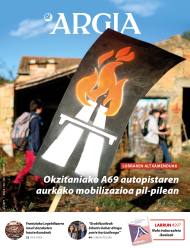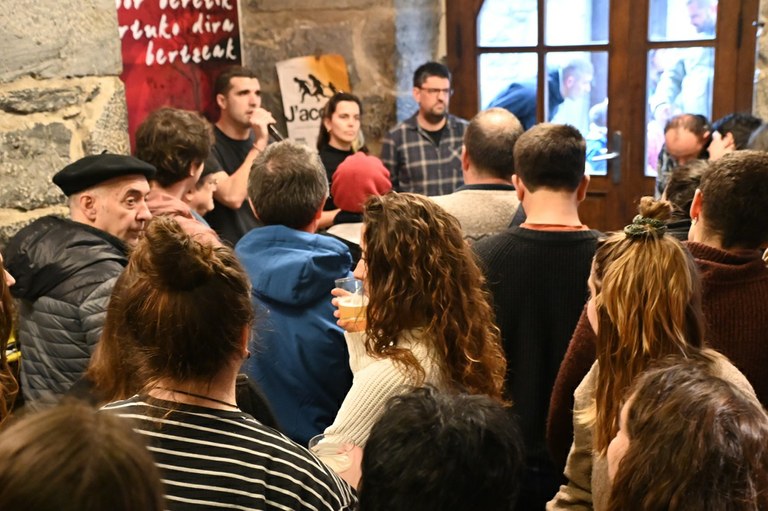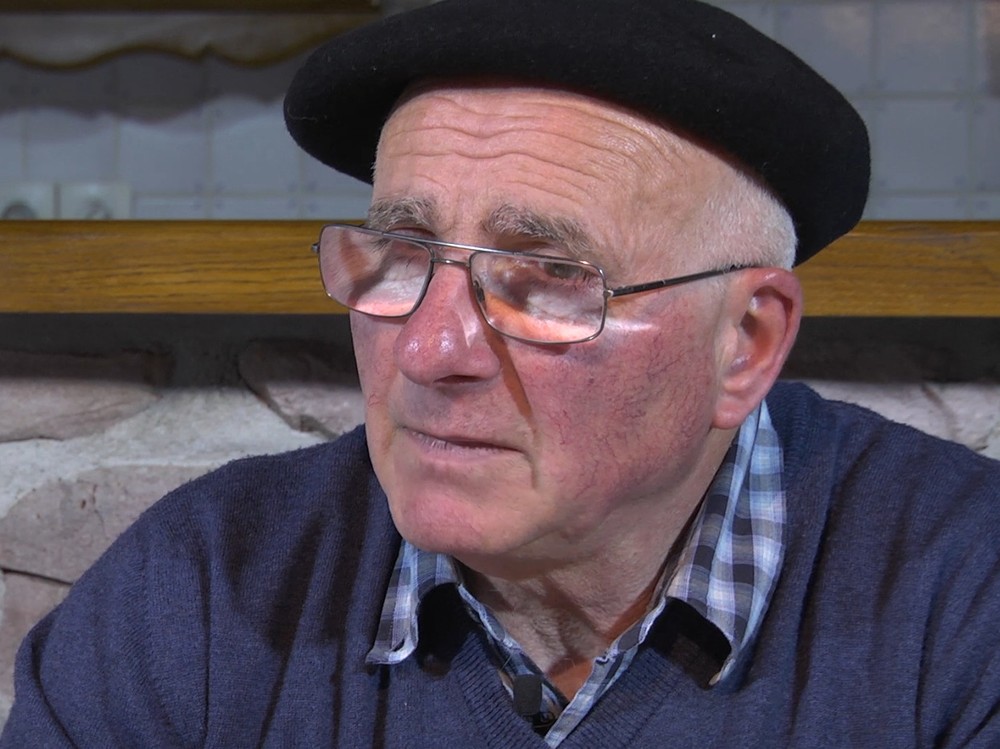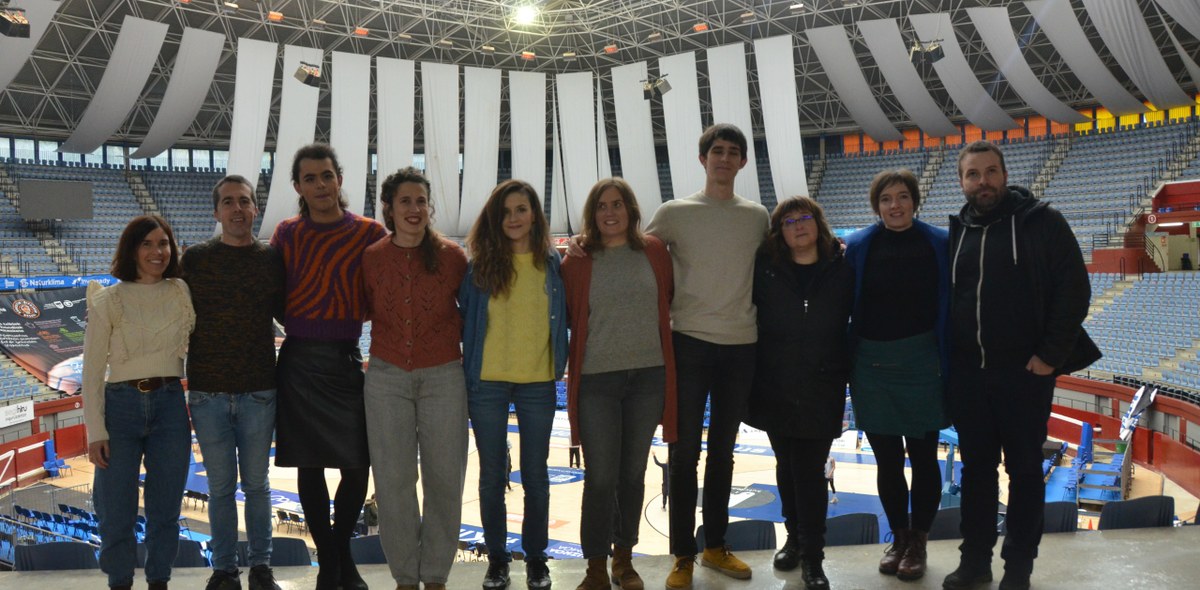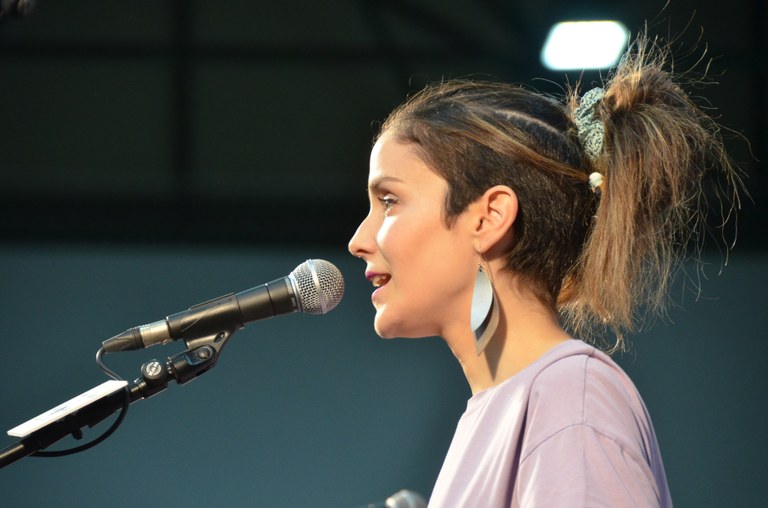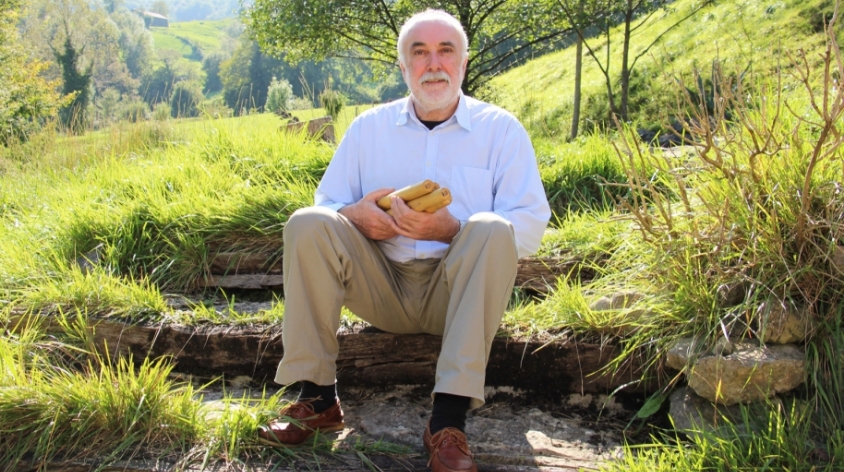“Paraphernalia and politics too, but we make bertsos”
- When last year he won the Lady’s Prize, Maider Arrangi wanted to express in his greeting “the people and causes that matter to him”: “The people of the Hell neighborhood, the chapels, the maricas, the friends against the TAV, the supporters of the occupation…”. All of them and others are the ones we brought up in this interview.
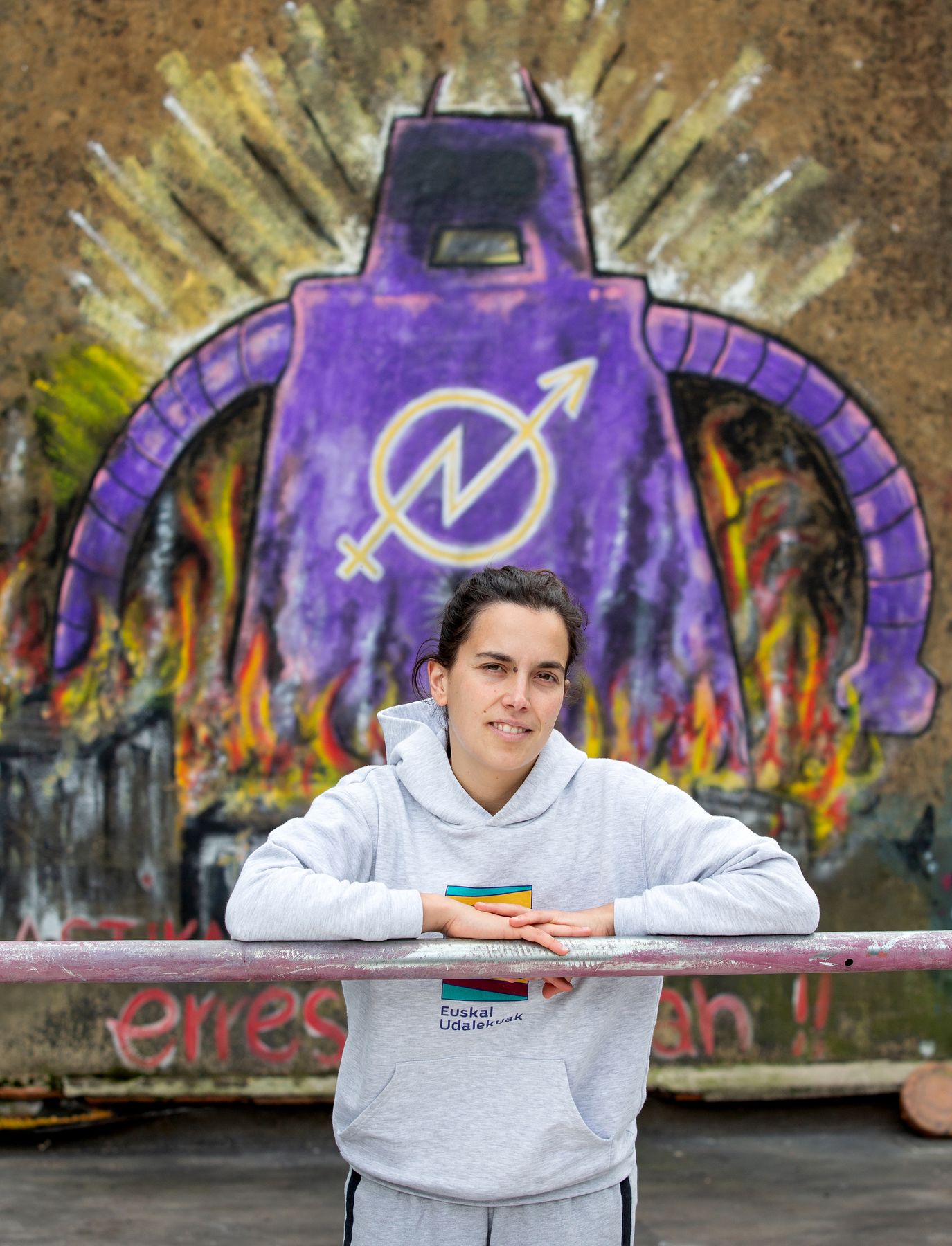
Maider Arrangi Markuleta. Oñati, 1996
Bertsolari and a transfeminist militant. He studied philosophy and works as a professor. He has been part of the organizing team of the Anderea Awards since its inception, and last year he was the bearer of the pamel. The Bertsolaris Gipuzkoa Championship has just been ranked, after winning the two tests of the qualifying phase. He's a member of the busy Infernu neighborhood.
The day before yesterday [8 June] the fourth edition of the bertsolaris Mrs. event was held in Portugalete. How about that?
I am quite happy that the Lady’s Prize has had continuity as an initiative, because at first there was a tour. We organized it among a few, and suddenly the fourth edition, and all of a sudden we're thinking about preparing something special for the next edition. For me, Mrs. sums up the politicity of creating a new verse circuit and the fun that all this gives us. It's a thing that we consciously do, to politicize Bertsolaris towards transfeminism, but at the same time we spend so well organizing, it's not an effort at all, and I want to live the Bertsolarism out there.
That has not always been the case.
I started in bertsos quite late, at 16. In the village bertso-eskola, most were men, but at the same time Bertso-Eskola was being a feminist. I still had no contact, but I saw on the Internet the conferences of Uxue [Alberdi] and Ainhoa [Agirreazaldegi]. In this sense, you continue to live in your body all the consequences of that certain misogyny of traditional bertsolarism, but at the same time see some people analyzing this, and even if they are still alone, I knew that at some point I would find some collective. At least I've lived it like this. I think our previous generation has lived much more intensely this contact with men, that background.
Not so much of you? The
forms of oppression that are described in the opposing gorges [Uxue Alberdi; Susa, 2019] – the personal and environmental pressure, feeling that your voice is not worth, that you do not contribute anything, that you are disabled –, I have felt it, of course. It's not the same to know what's going on than to fix it. You know that you are in a system of oppression, but that does not mean that you have already left it.
The previous generation could have lived through these oppressions raw, alone, and then analyzed it. You came to another point.
Analysis already received.
The contribution of some of your generation has clearly been from shellfishery or baldness. The origin of the Bertsos
Bollo was important to me and that is what we have done. The first one I remember with Saioa Alkaiza. The session, Amaia Agirre, I, also Eli Pagola. By then there were feminist programs, like “It’s no coincidence,” but the barefoot sessions were for me for the first time marking femininity from transfeminism and at the same time, recognizing all previous feminists. We are not dissociating ourselves from the previous ones. On the contrary: thanks to feminism so far, which thanks to them we have survived, thanks to them we have joined Bertsolarism. Without classes of empowering bertsolaris, I don't know if I would go on in verse during the years of my career.

What other milestones have you had? The first
would say it was winning the Oñati championship and then winning the interest, very young. I think a lot of tipas that we've been following in bertsos have won something very young: the rule gives you a minimal acceptance in some way, that you're good or, and without that, I don't know if I would go on, and that too has to be said. Then I would put all the milestones in feminism.
You mentioned the barefoot sessions earlier. The
first one we did in Pamplona, was proposed by Saioa, and took place in the context of June 28. At first there was a point of vertigo. To say that now we are pastries is almost a mantra, but at the beginning – and not so long ago, more than eight years ago – it was not something we were encouraged to stop. So I said, Benga, a bout session, let's get out of the closet.
This has changed now.
A lot. Now we go to the normal championships, and in our initial or final greetings, there's always the boot or cuir or transfeminist. The txapela of the program was a milestone in this sense and her final greeting: “Non-binary, zucchini, transas, marbles and grills.” Listen to all of them suddenly in the farewell of a champion... I'm not saying that Saioa has started that, but for me it's been a key piece saying all this very clear, very courageous.
The next milestone would be the Lady's Prize. There were some needs and reflections: questioning competence, making genealogy, recognizing the previous ones, creating a space for those who had abandoned bertsolari, incorporating gender dissidents… Apart from that, I think intergenerality
has been important, and including people who are not bertsolari in the organization, which is not the creation of a network in which suddenly it is not the bertsolaris. Then Oihana Arana, Maider Alday, Larraitz [Trojaola] and Estitxu [Agirre] took a great deal of work on the arbitrary criteria. The introduction of new criteria implies a new understanding of competition.

How has all this influenced traditional Bertsolaris? There is a lot of difference between the Gipuzkoa Championship five years ago and this year’s.
Five years ago, I was in a stumbling phase with the verse. For a while I was also living in Ondarroa: The bertsolaris championship in Gipuzkoa, and I in Ondarroa, imagine what that meant. I wasn't very berty at the time, and at the same time I didn't have the network that we have now. Now, for example, every Tuesday we meet at Hernani to make sex-seven kinds of bertsos: almost all of us are baskets, transfeminists, at the same time very different from each other, and just as we gather every two or three years each week. There is the basis of Christ to be motivated by the verse.
On the other hand, it seems to me that the world of bertso has been educated in some things. Five years ago, people don't think they know what cuir is, and now I don't know what it is, but they've heard it. You know what we're about, I think we've found a place there.
You've created it.
Yes. So I live this year's championship very collectively, and I live that we go to the competition, I'm not going to compete like Maider Arrangi, but I and my team are serious, we're not going for a ride. We don't believe in competition, but if we sign up, we want to be strong on that, we want to show that we know that in bertsos, in our circuits we also make bertsos, that it's not that men make bertsos and that we politics, themselves in verses and we paraphernalia. We paraphernalia and politics yes, but we do so in verse.
We're in hell. It's a busy neighborhood in San Sebastian.
In September it is nine years since our occupation. At first we were a group of students, all white, almost all of the faculties of philosophy and anthropology, and we occupied it at first, because in San Sebastián rentals are impossible, etc. At the same time it is a lie, almost all our families were able to allow us to rent, we were not particularly poor in the profile, but in the political project from the beginning there was the desire to oppose the gentrification of San Sebastián and the tourism project, at the same time that it gave some alternative to this housing issue. And the desire to live in community and collective. You live in a rental house with a maximum of two or three people, and here are organized whole blocks, an entire neighborhood is coordinated.
Here also lives people of another profile.
In addition to the building we occupied, here behind there was a factory that evicted in 2021, where many young boys lived from Morocco, from Algeria; Nigeria, Ghana, Senegal, Guinea… A lot of people from one site arrive in Europe with expectations that then pass through Europe that are not met. Most of them were in an irregular situation, many of them were on the street, they learned that there was a busy place here and a lot of people came to the factory.
We started to engage with them, especially to face police persecution together. In our buildings there were also more empty spaces, then a people from the factory began to come here, and then we began to grow and realize at the same time the project of the neighborhood, even if they are white, although they have many contradictions and are unconsciously racist, because in antiracism we have to militate, we have to get involved in some way, we have to socialize judicial, social privileges, etc. The neighborhood project we have developed a little in that direction, based on this alliance, especially for the last four years.
The neighborhood has been subjected to great police persecution. For example, last year did not reach the bertsolarism of Bolloageda because the Ertzainas closed the neighborhood [the Bolloageda project is organized by the Transmaribolloa Assembly of San Sebastian, around the festivity of Santa Águeda]. A
neighbor of our neighborhood is schizophrenic and had an outbreak at the gas station and I don't know very well who, a gas station or someone who was on the street, called the police saying there was a dangerous man on the street, with a knife. I didn't see it much, but well. The Ertzaines who came, the neighborhood that was emptied, perimetrally closed the whole neighborhood, with fences and I don't know what. It was my birthday the next day, and I had baked biscuits… He said I had to leave the house and that I didn’t want, I had a baked cake. I was afraid of him, not the neighbor. These anecdotes happen a lot, and there you see racism. I don't know if a white man had a schizophrenic outbreak on the street, the police would mount that kind of paraphernalia. Another example. There are neighbors who get hooked up again and again to see if they have marijuana; I don't know if that's what they do to white people, and we all smoke marijuana. But as a community, we have some kind of mutual surveillance in the face of police persecution, and other issues as well.

I would like to ask you about the eviction of 2021.Fue an illegal
eviction. They didn't notify, they didn't make a judgment: they came and emptied the factory, and two weeks later they kicked it out, and we don't know very well whether they had permits or not. And that was a really hard time, many of the neighbors stayed in the street. We coordinate with the Reception Network and with Sos Racism to try to find a home for all people. There, the occupation network was important for people to find another home, because institutions have resources but don't set them in motion.
At the same time, we gain a great deal of strength and alliances often emerge at such tough times. We made the manifests. Until then Hell was not well known and people saw that there is a political project here.
Some of the events of the return of 28 June have been held here.
This would also make it a milestone. Here we have done the concerts…
Did Ana hit, no?
The first thing that was done was a bertsos session. This was like coming out of the closet. One thing is for people to know that there is a project here and then another thing is to show the neighborhood to anyone who comes...
For me, Anari's concert was terrible, all of a sudden, lots of transfeminist people… We organized it from Hell to make money. Before there is a lot of preparatory work, the neighbors have been nervous since two weeks before, to fix: to assemble the bar, to improvise the haze… It has been very nice moments and the activities that have been organized here from the back of the Assembly.
Because he is a member of the Transmaribollo Assembly in San Sebastian.
There, too, we are militating for many, many years and well. I really like that assembly. It is quite practical, at the same time we are very politically positioned, and we are clear what are the struggles that must be done in San Sebastian as a transmaribollo. We mainly organize programmes in which the transfeminists of Donostia will meet. Perhaps we have not been in certain institutional struggles, but I believe that we are meeting the objective of uniting a role, the transfeminist force that exists at the moment in San Sebastian and giving a political direction to it. It is not a large assembly and it is not organised at national level, but I think it is important that it exists.
This year the motto of the June 28 demonstration will be “Transfeminists with Palestine!” live.
Yes. Genocide is going on, and we believe it is important that the forces are now heading there. Furthermore, the day of pride has depoliticised many of the institutions, they put flags on the Kursaal and on the town hall, and we are not in that kind of struggle, we are not just in favour of spectacularity. We understand the trans-Marivolla struggle as a struggle related to other struggles: if we are not against all oppression we are not served by the trans-Marivolla struggle, and we must denounce what is happening at the moment in Palestine. Furthermore, Israel uses pinkwashing to justify itself, so it is key to position itself as a transmaribollo in favour of Palestine.
Vagina Shadow(iko)
Group: The Mud Flowers.
The actors: Araitz Katarain, Janire Arrizabalaga and Izaro Bilbao.
Directed by: by Iraitz Lizarraga.
When: February 2nd.
In which: In the Usurbil Fire Room.
In recent years, I have made little progress. I have said it many times, I know, but just in case. Today I attended a bertsos session. “I wish you a lot.” Yes, that is why I have warned that I leave little, I assume that you are attending many cultural events, and that you... [+]







